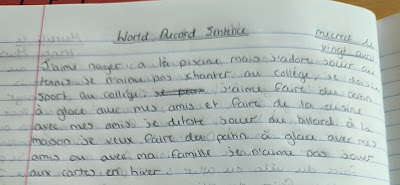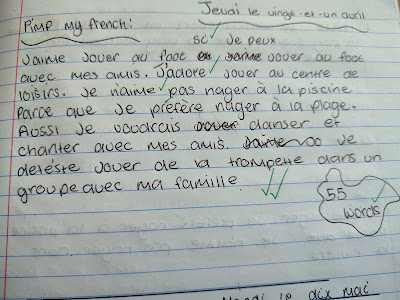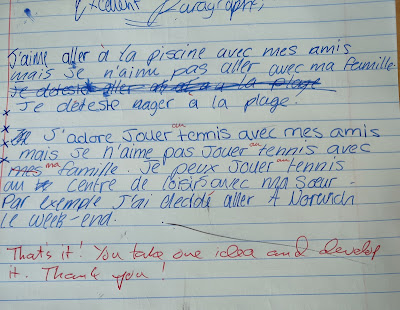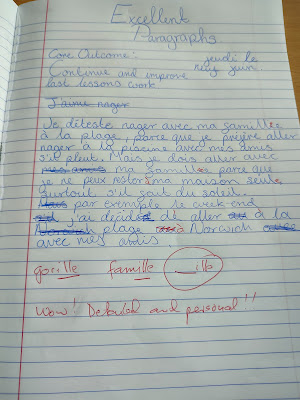You already met my Year 8 French group, with a Ready Steady French lesson that went a bit wrong, but turned out all right in the end because they really got the idea of using your French ingredients to make something good.
I've had a look through their books to see how we have developed their writing over this unit of work.
Of course, there was plenty of speaking too. With activities like Being Ben and Connectives Dice (in the second half of this earlier post).
The Connectives Dice involves throwing dice to get and, especially if, because, so, for example, but... to keep talking ad infinitum, without worrying too much about making sense. Just concentrating on really getting the French flowing. The written equivalent is World Record Sentences.
 |
| A world record attempt (unsuccessful) |
 |
| Pimp My French |
 |
| Pimp My French |
Both of these examples started with the same piece of simplistic writing. And both pupils have done their best to rearrange and re-write it. It is a very powerful process, where they start to work on the quality of the writing. It can be done just by adding conjunctions and removing repetition. For example by replacing j'aime... j'aime... j'aime with "J'aime... parce que je peux... et j'adore..." Or it can involve more sophistication in developing ideas or adding coherence.
We work on model answers on the board. And practise translating model answers in and out of French. We annotate model answers in colour and talk about which one reads the best.
Then we wrote the piece of work from last week's post, just writing "French out of my head". Again to prove that the French isn't the problem. And to make sure everyone has their ingredients ready. Here's a reminder:
 |
| French Out of My Head |
You can see from the feedback, that we are again moving from focusing on the French, to focusing on the quality of the writing. So this week, the pupils wrote their "Excellent Paragraphs". Trying to take one idea at a time and develop it.
This is the sort of thing we got.
 |
| Excellent Paragraphs. |
 |
| Read their Paragraph! |
 |
| Add convincing personal detail... |
The pupils are now very aware of their own progress. The end of unit Listening and Reading assessments show them how well they know the French they've been learning. And they understand that what happens in their books (and in Speaking) isn't about the French anymore. It's about how well they can use their French. In Speaking, it's increased spontaneity, fluency and self expression. In Writing, it's increased coherence, self expression and detail.


No comments:
Post a Comment